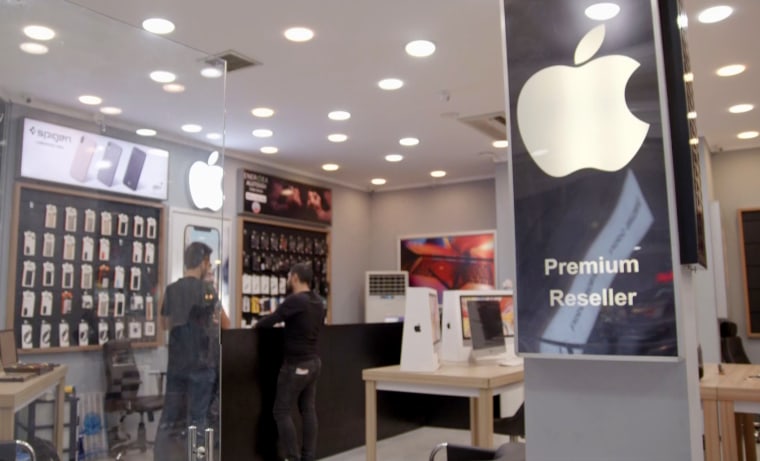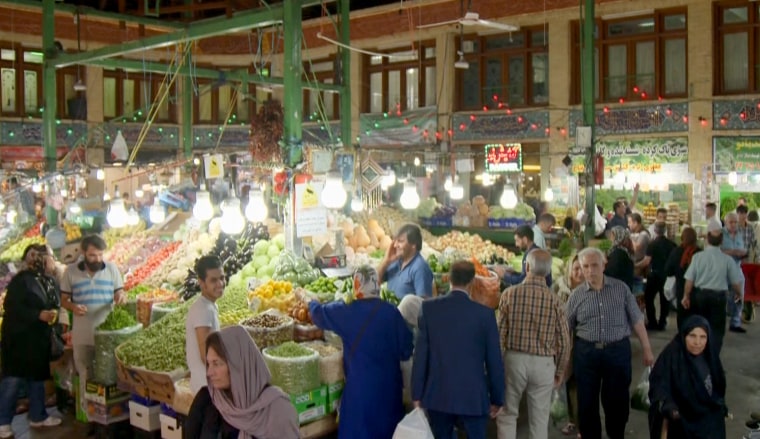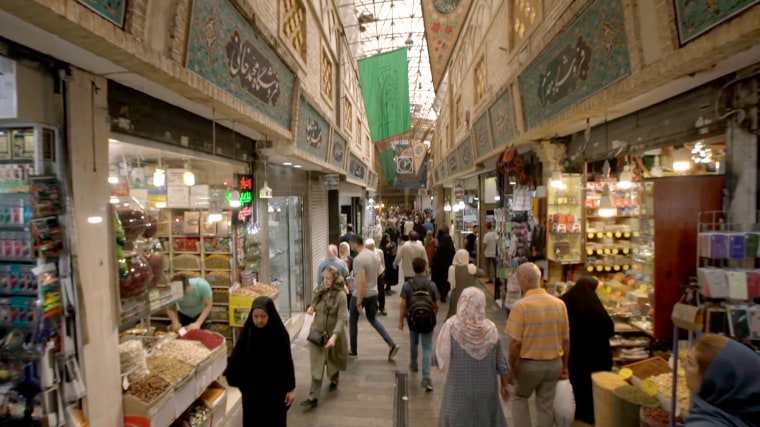TEHRAN — Like most other American businesses, Apple doesn't have a store in Iran and doesn't sell its products in a country targeted with tough economic sanctions by President Donald Trump.
But at a shop in Tehran, Iranians can buy an array of Apple tech gadgets, including iPhones and Mac laptops.
It's not an official Apple store approved by the Silicon Valley tech giant, but the company's sleek smartphones and watches make their way into the country anyway.
"I think this is the best brand in the world for any computer," the young shop owner, standing in front of an "Apple store" sign, told NBC News' Lester Holt. "These are very popular here."
The bustling shop illustrates how Iranian businesses try to sidestep the chilling effect of U.S. sanctions imposed by Trump, and that at least some citizens still have enough spending money to afford the latest tech consumer item.

Holt traveled to Tehran to get a first-hand look at how Iranians are adapting to the sanctions and how they view the United States at a moment of high tensions between the two countries.
The Trump administration says U.S. sanctions don’t apply to mobile phones or other devices used for personal communication. But many big U.S. and Western firms have stayed away from the Iranian market, anxious to avoid running afoul of an array of restrictions introduced in the past two years.
Despite the economic pain caused by U.S. sanctions, Iranian businesses have found ways around them, trading through opaque channels that skirt Washington's penalties.
"Don't forget that besides regular and official trade, we have a lot of gray trade with neighboring countries," said Cyrus Razzaghi, who works as a technology developer and consultant. "Some products come from Turkey, or from Iraq — the Kurdish regions. They come with small boats from the [United Arab Emirates] countries. So everything is widely available here."
Iranian traders "know how to get the products into Iran," said Razzaghi, who advises Western companies on how to operate legally in Iran. "And there is enough consumer demand, despite higher prices for those products to still be in the market."
By perfecting the art of the workaround, Iran has been able to endure U.S. sanctions, even while suffering a drop in living standards, he said.
"To be honest with you, the economy has shown great resilience," Razzaghi said, partly due to gray market trading. Unlike Venezuela, he said, Iran's economy is not spiraling out of control.
"So if a country under the harshest round of sanctions ever has double-digit inflation, OK, that's bad. It's hurting people. But it's not the end of the world."

From idle construction projects to soaring inflation, sanctions have hit the country hard, everyday Iranians told NBC News.
"Life has become harder for ordinary Iranians," Reza Hatami told Holt over a traditional Persian meal of barberry rice and lamb kebab.
He and his wife, Zahra, said they and other families have had to give up some luxuries, including vacations or expensive clothes, due to the collapse of Iranian rial.
"The Iranian currency lost a lot of its value, and the prices of everything, including food items, housing, automobiles, everything have jumped," Hatami said. "And it's very hard for ordinary Iranians to afford the life that they used to have just two years ago."
But the couple, who hosted Holt in their home for dinner, said they did not hold a grudge against the American people for actions taken by their president.
Iranian authorities have blamed the sanctions for endangering the lives of patients deprived of crucial drugs. Officials invited an NBC News team to visit a hospital in Tehran, where doctors said they faced a shortage of some important drugs, including cancer medicine for children.
The Trump administration says the sanctions allow for the import of medicine and other humanitarian goods, and allege that the regime's mismanagement is to blame for any shortage of drugs or medical equipment.
But Arash Ahmadian, head of the Mahak Pediatric Cancer Center, scoffed at the administration's stance, saying that strict U.S. financial sanctions have spooked foreign banks from touching any transaction with Iran, even for those permitted under the sanctions laws.

"It's a joke I think, it's a joke. Because we don't have any channel for paying money for buying pharmaceuticals," Ahmadian said.
Iran has always relied heavily on its vast oil reserves to drive its economy, but the Trump administration's "maximum pressure" campaign has dramatically slashed the country's oil exports over the past year.
In an interview with NBC News, Iran’s central bank governor Abdolnaser Hemmati declined to say exactly how much oil Iran is currently selling. But he insisted oil was getting through, saying that "we have managed to continue our oil exports."
He added: "So about the exact figures and statistics, let’s keep them with us."
Trump withdrew the United States from a nuclear agreement between Iran and world powers last year and has imposed a wave of economic sanctions on the country's oil, banking and other key sectors. The 2015 nuclear deal eased U.S. and U.N. sanctions on Iran in return for limits on Tehran's nuclear program
The Trump administration has said it will lift the sanctions once Iran meets a list of conditions, including ending its support of militants across the Middle East and curtailing its ballistic missile program.
Iran's Foreign Minister Mohammad Javad Zarif, in an exclusive interview with NBC News on Monday, accused the Trump administration of waging economic "terrorism" on his country and causing needless suffering for the Iranian people.
But he said Iran would find a way to sell its oil and to meet the needs of the Iranian population, and that sanctions would not cause Tehran to alter its approach.
"Iran's will never break. If we were going to break under maximum pressure, we would not have stood against Genghis Khan and Alexander and all others who invaded our country," Zarif said.
Ali Arouzi reported from Tehran and Dan De Luce reported from Washington, D.C.